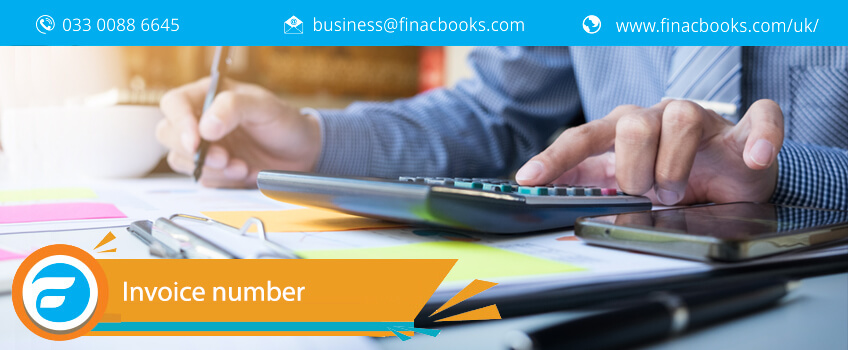What is an Invoice Number?
An invoice is not considered a legal document without an invoice number. Every invoice issued is assigned with a unique, sequential code which is called the invoice number. There are multiple invoices, and it is difficult to remember each invoice. Therefore, to quickly identify each and every invoice, a unique number is assigned to it. The invoice numbering system helps identify every invoice and make a difference in comparison to other invoices. You can easily track payments with the help of an Invoice number, even help recognise and avoid duplicate payments.

Why do you need an Invoice Number?
As per invoicing system in the EU, every invoice should have a unique sequential order identifying the invoice unless it will not be considered a legal document. A unique invoice number should always be printed on the invoice document to make it different from the other invoices. The sequential numbering on invoices helps suppliers, buyers, and tax authority locate invoices concerning any transaction. An Invoice number is very useful when you have more than one transaction with the same customer on the same date. With the help of invoice number format, tax authorities can easily cross-check invoices against sale & expense records. Invoice number also helps in finding your old and missing invoices as well as showing the status of each and every invoice.
How to build an Invoice Number?
The Invoice number can be created in many different ways. Different peoples use different methods and even come up with their own sequencing method too. The method used should be consistent, easy to understand while doing audit work. There are two rules which should be followed by each & every company while numbering invoices –
1) Always use sequential number and chronological invoice number
2) Always use a unique invoice number.
3) Different methods that are used to assign invoice numbers are as follows -
1. Global sequencing – This method is useful for companies that don’t issue lots of invoices. In the global sequencing method, you may include the month or year of issue in the invoice number as a part of sequencing. In this method, invoice numbers do not change as per change in client, project or goods sold.
2. Per client sequencing – In this method, sequential invoice numbers are made as per the client code followed by the numeric sequence. With the help of this method, you can easily differentiate your clients based on the invoice number. Some companies use identifiers related to the project, product or service instead of using a client code. For example – XYZ012, in this example, “XYZ” represents the client code, and “012” is a number sequence attached to it.
3. Document type – In this method, invoice numbers are not assigned on the basis of sequence or a client number but document types related to your operations. This is considered a good idea to include document type in the numbering system by starting the invoice number with “INV” or “invoice” & “PROFORMA” in the case of Proforma invoices.
4. Invoice data capture solution – In this method, invoice numbers are not assigned based on sequence or client numbers. but on document types related to your operations.Invoice data capture solution catch invoice numbers from OCRed text. Invoice numbers are not always in the number format, so that the invoice receiver may not be able to know that which element refers to the document number.
With the help of Finacbooks, you can use invoicing software offered by chartered accountants as per your needs and preferences to make your invoicing work easier by way of automation.
In today's world, invoicing software helps in putting numbers on invoices automatically if you didn’t set up your own invoice template. Cloud accounting software helps companies in choosing the invoice templates they desire.
How to assign Invoice Numbers?
Invoice numbering should be assigned in sequential order. Make sure that your chronological invoice numbering will go on increasing, and it should not be repeated or contains any gap. A common way to create an invoice number is to include a month or year in the invoice number when it is issued. For example – As we were currently running in 2018 and we have to issue our first invoice this year, it could be numbered as “180001”, the next invoice numbers would be “180002”, “180003 and so on. When 2019 will begin, we will start numbering our invoices as “190001”, “190002”, and so on. By following this numbering system, we can easily track invoices on a yearly basis.
It is not a good idea to number invoices on the basis of numerical only, such as 1, 2, 3 etc., as it can lead to confusion when your invoice numbers reach double or triple figures. New businesses do not contain many invoices as they have just started the business, but it is important that you should choose an effective invoice numbering system unless it hampers your future growth.
Need of alphanumeric invoice numbers
Invoice numbers should be alphanumeric means they should not contain only numbers. There is a need to create a unique code with a mixture of numbers, letters & special characters (Slashes (/) or dashes (-)) so that you can easily organise your records & identify invoices. An alphanumeric invoice number series should follow the same rule as regular invoice number series. It should be in sequence and does not contain any gaps. Small abbreviations are used for different types of documents. For ex – “INV” for invoice and “QUT” for quotation number.
When you use invoice number series; the abbreviations or letters used will not change, only numbers will increase. Examples of some of the alphanumeric invoice sequences include –
1) 18-QUT-0001
2) 2018/0001
3) 18/0001
4) 2018/INV/0001
If you want to change the invoice number series entirely
If you want to change your invoice number series entirely, you must wait until the next accounting period. If you do not wait, it will create confusion and increase problems such as missing or duplicate invoice numbers etc.
When a number is assigned to an invoice, it should be unique. If you assign the previously used number to any new invoice, it will create duplicacy in financial records as well as create confusion & invoice number errors.
Deletion of invoices
As a standard rule, invoices should not be deleted. If any transaction is completed and the company deletes the invoice, it will create a gap in your financial records. Therefore, rather than deleting an invoice, kindly issue a credit note for the same amount. This will effectively cancel out the transaction and will not affect your number sequence too.
How Finacbooks help?
FinacBooks is a leading platform where you can search for qualified accountants offering a range of services like Bookkeeping, VAT Registration & Return filing, Payroll registrations and RTI returns, Pensions and auto-enrolment, Tax investigation service, Business plans, management accounts and more. We have better options where you can use automated invoice software which helps you manage your invoices effectively and efficiently.
Any Questions? Request a callback from our Tax Experts.


































